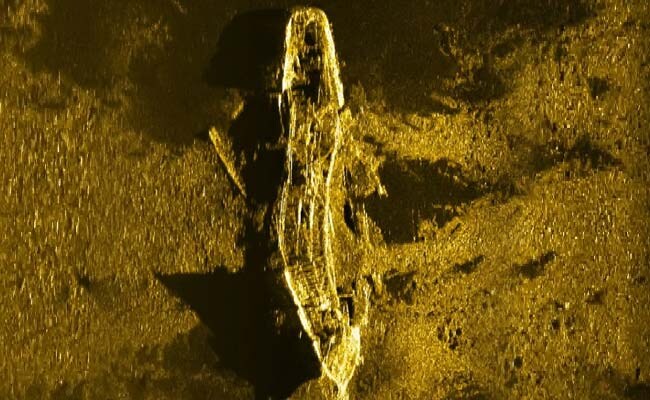
An Australian-led team continues to scour the southern Indian Ocean seabed in hope of finding the final resting place of MH370, which vanished on March 8, 2014.
Sydney, Australia:
The hunt for missing Malaysia Airlines Flight MH370 has uncovered a shipwreck deep underwater, officials said Wednesday, the second such discovery since the search began almost two years ago.
An Australian-led team continues to scour the southern Indian Ocean seabed in hope of finding the final resting place of MH370, which vanished on March 8, 2014 en route from Kuala Lumpur to Beijing with 239 people on board.
In July last year, a two-metre-long (almost seven-foot) flaperon wing part washed up on a beach on the Indian Ocean island of Reunion and was confirmed to be from the ill-fated flight, marking the first concrete evidence that it met a tragic end.
Nothing has been found since despite more than 80,000 square kilometres of the seafloor being searched, based on satellite analysis of the jet's likely trajectory after it diverted from its flight path.
But another shipwreck -- an iron or steel-hulled vessel believed to have gone down at the turn of the 19th century -- has been discovered some 3,700 metres deep.
"On December 19, 2015, an anomalous sonar contact was identified in the course of the underwater search, with analysis suggesting the object was likely to be man-made, probably a shipwreck," said the Joint Agency Coordination Centre (JACC).
One of three ships searching for MH370, Havila Harmony, used an autonomous underwater vehicle to further examine the find and captured high-resolution sonar imagery.
"The Shipwreck Galleries of the Western Australian Museum have conducted a preliminary review of some sonar imagery and advised that the vessel is likely to be a steel/iron vessel dating from the turn of the 19th century," added JACC.
It is the second wreck found during the hunt.
In May last year, sonar imagery revealed an anchor, along with other objects searchers said were man-made as well as what are thought to be lumps of coal.
Investigators believe MH370 ran out of fuel and crashed somewhere in the southern Indian Ocean, sparking one of the biggest mysteries in aviation history.
Speculation on the cause of the plane's disappearance has focused primarily on a possible mechanical or structural failure, a hijacking or terror plot, or rogue pilot action.
Despite the satellite evidence pointing to the plane going down, many Chinese relatives of those on board remain sceptical, and are convinced their loved ones are alive, perhaps being held at an unknown location.
Analysts have said that only by locating the crash site and recovering the black box will authorities be able to solve the mystery of why the plane went down.
An Australian-led team continues to scour the southern Indian Ocean seabed in hope of finding the final resting place of MH370, which vanished on March 8, 2014 en route from Kuala Lumpur to Beijing with 239 people on board.
In July last year, a two-metre-long (almost seven-foot) flaperon wing part washed up on a beach on the Indian Ocean island of Reunion and was confirmed to be from the ill-fated flight, marking the first concrete evidence that it met a tragic end.
Nothing has been found since despite more than 80,000 square kilometres of the seafloor being searched, based on satellite analysis of the jet's likely trajectory after it diverted from its flight path.
But another shipwreck -- an iron or steel-hulled vessel believed to have gone down at the turn of the 19th century -- has been discovered some 3,700 metres deep.
"On December 19, 2015, an anomalous sonar contact was identified in the course of the underwater search, with analysis suggesting the object was likely to be man-made, probably a shipwreck," said the Joint Agency Coordination Centre (JACC).
One of three ships searching for MH370, Havila Harmony, used an autonomous underwater vehicle to further examine the find and captured high-resolution sonar imagery.
"The Shipwreck Galleries of the Western Australian Museum have conducted a preliminary review of some sonar imagery and advised that the vessel is likely to be a steel/iron vessel dating from the turn of the 19th century," added JACC.
It is the second wreck found during the hunt.
In May last year, sonar imagery revealed an anchor, along with other objects searchers said were man-made as well as what are thought to be lumps of coal.
Investigators believe MH370 ran out of fuel and crashed somewhere in the southern Indian Ocean, sparking one of the biggest mysteries in aviation history.
Speculation on the cause of the plane's disappearance has focused primarily on a possible mechanical or structural failure, a hijacking or terror plot, or rogue pilot action.
Despite the satellite evidence pointing to the plane going down, many Chinese relatives of those on board remain sceptical, and are convinced their loved ones are alive, perhaps being held at an unknown location.
Analysts have said that only by locating the crash site and recovering the black box will authorities be able to solve the mystery of why the plane went down.
Track Latest News Live on NDTV.com and get news updates from India and around the world

